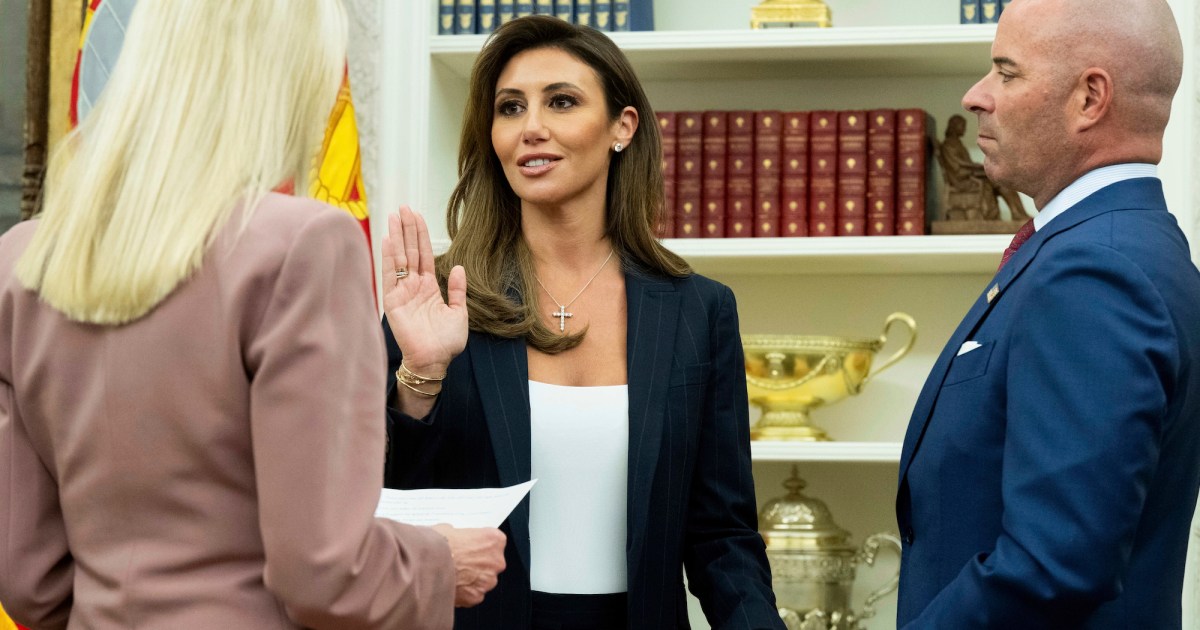
The Unconventional Rise of Alina Habba: From Trump’s Lawyer to Interim US Attorney
The appointment of Alina Habba, formerly President Donald Trump’s personal lawyer, as interim US attorney for New Jersey has stirred considerable debate and raised ethical questions. On March 28, Habba was sworn into this significant role, placing her in charge of overseeing a vast team of 170 lawyers handling a wide array of critical cases. These range from prosecuting terrorism, addressing public corruption, and combating gang activities to defending federal agencies in court. This position, once graced by legal giants such as US Supreme Court Justice Samuel Alito and former New Jersey Governor Chris Christie, now sits in the hands of someone with a decidedly unconventional background for such a post.
What makes Habba’s appointment particularly striking is her limited prosecutorial experience. Unlike her predecessors, she lacks a substantial background in criminal prosecution. Her most notable legal endeavor involved a lawsuit against Hillary Clinton, which a federal judge deemed so frivolous that he sanctioned both Habba and Trump nearly $1 million in 2023. Judge Donald Middlebrooks stated plainly that “no reasonable lawyer would have filed it,” characterizing the suit as politically motivated and devoid of any valid legal claim. This raises questions about her suitability for a role that demands impartiality, sound judgment, and a deep understanding of the intricacies of federal law.
Adding to the controversy is Habba’s continued involvement with events that appear to align with the MAGA movement. Days after assuming her role as interim US attorney, she was advertised as a speaker at Clay Clark’s “Make American Business Great Again” conference in Tulsa, Oklahoma. This event, promising attendees insights into business growth through search engine optimization, branding, and sales training, seems an odd fit for the state’s top federal prosecutor. Such involvement raises concerns about potential conflicts of interest and whether Habba can truly maintain the necessary distance from partisan politics required of her office.
A Closer Look at Alina Habba’s Background and Associations
To fully understand the controversy surrounding Habba’s appointment, it’s crucial to examine her background and associations more closely. Her deep ties to Donald Trump are well-documented, having served as his personal lawyer in various high-profile cases. This close relationship naturally raises questions about her ability to remain impartial when dealing with matters potentially involving the former president or his associates. Additionally, her participation in events like the “Make American Business Great Again” conference, organized by figures deeply entrenched in the MAGA movement, further fuels concerns about her political leanings and potential biases.
Clay Clark, the promoter behind the conference, is a controversial figure in his own right. A former DJ and failed Tulsa mayoral candidate, he gained prominence as a vocal opponent of mask mandates during the COVID-19 pandemic. He also created the ReAwaken America tour, a far-right Christian nationalist event featuring a mix of MAGA personalities, anti-vaxxers, election deniers, and QAnon supporters. Habba’s presence at such events, alongside individuals who have faced prosecution from the very Justice Department she is now a part of, paints a concerning picture of her judgment and priorities.
Consider, for instance, the presence of figures like Simone Gold, an anti-vaccine doctor who served time in prison for her involvement in the January 6th Capitol riot, or Peter Navarro, a former Trump White House trade advisor who was imprisoned for contempt of Congress. Habba’s association with these individuals, coupled with her past statements on QAnon-adjacent podcasts suggesting that court cases against Trump were the work of Satan, raise serious doubts about her ability to uphold the principles of justice and impartiality.
Ethical Concerns and Potential Conflicts of Interest
The ethical implications of Habba’s appointment and her continued involvement with partisan events cannot be overstated. According to Stephen Gillers, a law school ethics professor at New York University, it harms public confidence in the rule of law for a US attorney to be a prominent speaker at a conference with a partisan political or ideological focus. Traditionally, the Justice Department has relied on good judgment and self-restraint to avoid such conflicts. However, these qualities appear to be in short supply within the Trump administration, as evidenced by other recent incidents involving interim US attorneys.
Ed Martin, the acting US Attorney for the District of Columbia, headlined a fundraiser for a conservative group he ran before joining the administration, an event attended by January 6 defendants. Sigal Chattah, the interim US Attorney for Nevada, reportedly participated in a state Republican Party meeting, potentially violating Justice Department rules prohibiting political activities. These instances, along with Habba’s case, suggest a troubling pattern of blurring the lines between political activity and government service.
The potential conflicts of interest arising from Habba’s deep ties to Trump and her involvement with MAGA events are particularly concerning. Can she truly be expected to impartially oversee cases that may involve the former president or his allies? Will her political leanings influence her decisions as a prosecutor? These are legitimate questions that demand careful scrutiny. The integrity of the Justice Department and the public’s trust in the legal system depend on it.
The Implications for New Jersey and the Justice Department
Habba’s appointment and her actions have far-reaching implications for the state of New Jersey and the Justice Department as a whole. As interim US attorney, she holds significant power and responsibility, overseeing critical cases and shaping the direction of federal law enforcement in the state. Her lack of prosecutorial experience and her apparent political biases raise concerns about her ability to effectively and impartially fulfill these duties.
Furthermore, her continued involvement with partisan events undermines the credibility of the Justice Department and erodes public trust in the legal system. When the top federal prosecutor in a state appears to be aligned with a particular political movement, it raises questions about the fairness and impartiality of the justice system. This can have a chilling effect on individuals who may be hesitant to come forward with information or seek justice through the courts, fearing that their cases will be influenced by political considerations.
In light of these concerns, it is imperative that Habba take steps to address these issues and demonstrate her commitment to upholding the principles of justice and impartiality. This may involve recusing herself from cases that pose a conflict of interest, refraining from participating in partisan events, and publicly reaffirming her commitment to the rule of law. Only then can she begin to restore public confidence in her leadership and the integrity of the Justice Department.
A Call for Accountability and Transparency
The appointment of Alina Habba as interim US attorney for New Jersey serves as a stark reminder of the importance of accountability and transparency in government. Her unconventional background, coupled with her continued involvement in partisan events, raises serious ethical concerns and undermines public trust in the legal system. While her creation of a Human Trafficking Task Force is laudable, it does not erase the questions surrounding her suitability for such a prominent role.
As Habba’s 120-day tenure as interim US attorney progresses, it is crucial that her actions are closely scrutinized and that any potential conflicts of interest are addressed promptly and transparently. The integrity of the Justice Department and the fairness of the legal system depend on it. The public deserves assurance that those in positions of power are acting in the best interests of justice, not in the service of partisan politics. Only then can we truly uphold the principles of equality, fairness, and the rule of law upon which our nation was founded.


